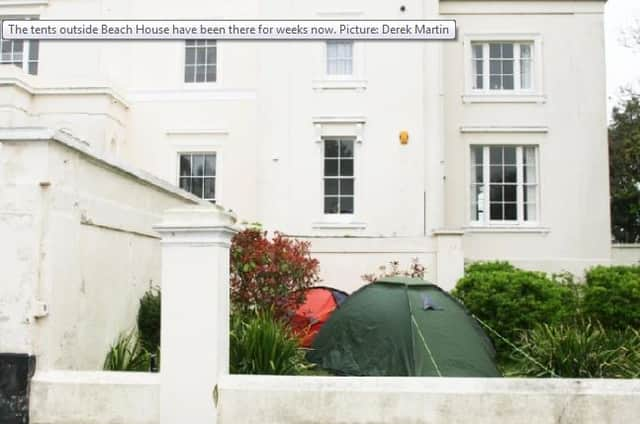These are your legal rights if someone sets up camp on your land


The idea of someone setting up camp on your land or in your front garden would likely unsettle any homeowner.
But travellers and the homeless often make use of such land while moving around, making temporary homes on fields, roadside areas and even in people's gardens.
Homeless squatting


Advertisement
Hide AdAdvertisement
Hide AdResidents in Worthing, West Sussex, were recently faced with a number of homeless people setting up camp in their front garden.
Local resident Robin Biggs claimed two men and a dog moved onto a communal patch of garden outside a Grade II listed Beach House in March this year, squashing a flowerbed that had just been renovated at a cost of £100 to tenants.
However, when reported to the council residents were told they would need an eviction notice to remove the squatters from the land.
Another tent has since been pitched up in recent weeks.
Mr Biggs said: "I was absolutely devastated. I thought my wife was joking when she told me.
Advertisement
Hide AdAdvertisement
Hide Ad"All we were doing was trying to make it look beautiful to anyone in the car park or on Brighton Road. Is that a crime?
"I want the tents removed before there are more and the land tidied up again.
"I would also suggest some sort of railing with a gate around the area so it can stop them coming in.
"They just dump their rubbish everywhere. They are just not tidy."
Advertisement
Hide AdAdvertisement
Hide AdWorthing Borough Council said the squatters have now been visited by a welfare team and it is now progressing with a notice to evict them.
If squatters are on open land you would need to consider civil remedies such as Interim or Standard Possession Orders (Photo: Shutterstock)
What are your legal rights?
Rob Hodson, legal executive at DAS Law, explains your legal rights to get travellers or homeless people to move if they trespass on your property or land:
The rules in relation to the removal of squatters from residential and commercial property differ and every case would need to be considered on its own merits by a legal professional.
Advertisement
Hide AdAdvertisement
Hide AdHowever, in general terms, squatting in a residential building can now be considered a criminal offence under Section 144 Legal Aid, Sentencing and Punishment of Offenders Act 2012 (LASPOA 2012).
This applies where:
a person is in a residential building as a trespasser having entered it as a trespasserthe person knows or ought to know that he or she is a trespasser andthe person is living in the building or intends to live there for any period
A defence could arise if someone enters the property in good faith, believing they had permission to do so or if they are remaining after the completion of a tenancy or licence.
Your first step should be to contact the police who will be able to take action if there is a trespasser in your property.
Advertisement
Hide AdAdvertisement
Hide AdIn the event of a non-residential building, or if the squatters are on open land, then it is unlikely that this would amount to a criminal offence and instead you would need to consider civil remedies such as Interim or Standard Possession Orders under Part 55 of the Civil Procedure Rules.
Once an order is granted, if the squatter did not comply with the order to leave the property, ultimately you would then be able to instruct bailiffs to remove the squatters.
These orders are time sensitive and legal advice should be sought as a matter of urgency once squatters are discovered to ensure that the best possible outcome can be reached.